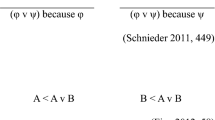Abstract
In the preceding chapter we examined both the ontological and the logical structures of deontic judgments. We argued that they are propositions so that their implicational structure is partly a special case of the implicational structure studied in Chapter 3. In developing the special additional principles that govern deontic implication we proceeded, essentially, along the inferential approach. Given the coincidence of the inferential and the semantical approaches to implication discussed in Chapter 3, §17 and §22, there must be some principles of deontic truth that provide a semantical underpinning for the inferential deontic principles gathered in Chapter 7. In this chapter, building on Chapter 5, we discuss several ways of underpinning semantically those principles of implication. Naturally, these ways are coincident or “equivalent” to one another as well as to the inferential system erected in Chapter 7. These coincidences are discussed in Chapter 9, which contains a cumulative formal theory of the logical structure of all the practical noemata we have been studying since Chapter 1.
Access this chapter
Tax calculation will be finalised at checkout
Purchases are for personal use only
Preview
Unable to display preview. Download preview PDF.
Similar content being viewed by others
References
Hans Reichenbach, Elements of Symbolic Logic (New York: The Macmillan Company, 1947), pp. 319ff. He calls a term expressive on a given use if it does not on that use “stand in the place of an argument variable, or a functional variable, or a prop-ositional variable” (p. 319). He explains how the copulative term ‘is’ is expressive in his sense in the sentence ‘Peter is tall’, and shows how the copula can be referred to by means of a relational term. For instance, in ‘Peter has the argument-function relation with respect to tallness’ the term ‘argument-function relation’ denotes the copula, which is also expressed by the verb ‘has’ (p. 322). The copula is thus in need of being expressed, even when denoted or referred to. Thus, too, the word ‘is’ is a merely expressive term. Reichenbach characterizes a logical term as one which “is merely expressive and indispensable, or [as one that] is definable by means of such terms” (p. 323): logical terms “produce certain sign structures and thus do something; but they do not say something. They can only express features existing outside the realm of signs” (p. 322). Reichenbach’s characterization of logical terms is insightful. Whether it is sufficient or not to make a term logical, it sheds light on the nature of words expressing deontic operators (regardless of whether one calls them logical or not). Thus the terms ‘ought’ and ‘it is obligatory that’ are expressive in Reichenbach’s sense; they express a structure, outside the realm of signs, that propositions like *John ought to go* and *It is obligatory that Mary work* have. They do not predicate that structure of the latter propositions — much less of the sentences expressing the propositions. Furthermore, the transposition of Reichenbach’s insight to propositions allows us to see why propositions of the form *a is A* are different from the corresponding propositions of the form *a exemplifies A-ness*.
This is one of my oldest theses. It goes back to 1952 when I wrote ‘An Essay on the Logic of Commands and Norms’, presented as an M.A. thesis to the Graduate School of the University of Minnesota. The implicational analysis, discussed below in §2, as Semantical Thesis No. 3, was published about 12 years belatedly in ‘Actions, Imperatives, and Obligations’, Aristotelian Society Proceedings, October, 1967, 68 (1967–68): 25–48. On the other hand, Semantical Thesis No. 2 bad to wait until the erroneous analyses of Legitimacy values given in ‘Imperative Reasonings’, Philosophy and Phenomenological Research 21 (1960), pp. 37ff., were corrected. The set-theoretical system of §3 had to wait the developments contained in the papers mentioned in note 3 below.
Among the principal originators of the set-theoretical elucidation of modal logic are: (1) Stig Kanger, Provability in Logic (Stockholm: Almquist & Wiksell, 1957); ‘A Note on Quantification and Modalities’, and ‘On the Characterization of Modalities’, both in Theoria 23 (1957); (2) Saul Kripke, ‘A Completeness Theorem in Modal Logic’, The Journal of Symbolic Logic 24 (1959), and ‘Semantical Analysis of Modal Logic I’, Zeitschrift für mathematische Logik und Grundlagen der Mathematik 9 (1963); (3) Jaakko Hintikka, ‘Modality and Quantification’, Theoria 27 (1961), and ‘The Modes of Modality’, in Acta Philosophica Fennica XVI (1963) devoted to Modal and Many-Valued Logics; (4) Richard Montague, ‘Logical Necessity, Physical Necessity, Ethics, and Quantifiers’, Inquiry 3 (1960).
Author information
Authors and Affiliations
Editor information
Editors and Affiliations
Rights and permissions
Copyright information
© 1982 D. Reidel Publishing Company, Dordrecht, Holland
About this chapter
Cite this chapter
Castañeda, HN. (1982). Deontic Truth. In: Castañeda, HN. (eds) Thinking and Doing. Philosophical Studies Series in Philosophy, vol 7. Springer, Dordrecht. https://doi.org/10.1007/978-94-010-9888-5_8
Download citation
DOI: https://doi.org/10.1007/978-94-010-9888-5_8
Publisher Name: Springer, Dordrecht
Print ISBN: 978-90-277-1375-9
Online ISBN: 978-94-010-9888-5
eBook Packages: Springer Book Archive




